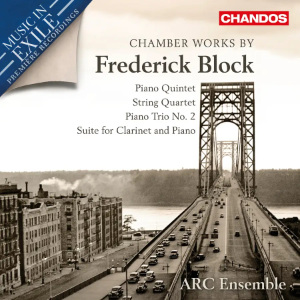
Frederick Block (1899-1945)
Piano Trio No.2, Op.26 (1930)
String Quartet, Op.23 (1928-1930)
Suite for Clarinet and Piano, Op.73 (1944)
Piano Quintet, Op.19 (1929)
ARC Ensemble
rec. 2023, Koerner Hall, TELUS Centre for Performance and Learning, Royal Conservatory of Music, Toronto, Canada
Chandos CHAN20358 [70]
Many readers may be aware of the work of the ARC Ensemble, especially their Music in Exile series on Chandos. It seeks to revive works lost in the various totalitarian upheavals of the twentieth century. ARC stands for Artists of the Royal Conservatory in Toronto. Under the leadership of their Artistic Director, Simon Wynberg, they have ‘excavated’ music of such composers as Robert Müller-Hartman (review ~ review), Dmitri Klebanov (review), Walter Kaufmann (review) and Jerzy Fitelberg (review ~ review), among others. The Ensemble’s latest discovery is Friedrich Bloch, who changed his name to Frederick Block after arriving in America.
Frederick Block may be even less familiar than usual. Simon Wynberg found his compositions while researching neglected composers in the New York Public Library. It is to his almost monograph-length album notes that I am indebted for most of my information. Block was the son of a well-to-do Viennese Jewish family and until his exile did not have to work: his fortune enabled him to spend all his time composing. He was quite prolific, and had acquired a fair measure of fame by the early 1930s. Like so many other artistic figures whom Nazis considered entartete [degenerate), he had to emigrate, first to England, then to America. In addition to the shock of adjusting to a new country and a new language, he also had to make a living for the first time in his life. He died in June 1945, three months short of his 46th birthday, when he would have qualified for American citizenship.
Several factors stand out in the three pre-exile works here. The first is an innate Vienna-ness, if I may. No composer, not even any of the Strausses, breathes the atmosphere of that city the way Block does. Another quality is his great admiration for the music of Gustav Mahler, whose Symphony No.10 he arranged for piano four-hands. Equally prevalent is the influence of Erich Wolfgang Korngold, who was an established musical presence in Vienna before Block turned 21. Like Korngold’s, his music is full of forceful, almost swinging melodies, which keeps things from becoming dull. The latter quality is especially needed in the String Quartet, which I found not as interesting as the other two earlier works. The first two movements are cheerful and sunny. The best is the third, played in “marionette” style. The fourth movement is a little more serious than what has gone before, and is of greater harmonic interest.
The Piano Trio No.2 strikes deeper than the String Quartet. The opening Andante and the Vivace that follows have that upward sweep already mentioned, and are more harmonically challenging than the Quartet. The third movement, marked Adagio, is like a very sad folksong; Block’s development is very eloquent. The Vivace last movement has several dance-like episodes, including a tango, and ends very positively.
The Piano Quintet is even more impressive than the Piano Trio. It opens with same feeling of uplift as the other two pieces, and one quickly finds that the piano quintet form is ideally suited to Block’s talents. The central section is pensive and affecting, and the end of the movement is rather sad. The Andante moderato middle movement continues the sad mood, with, as Wynberg puts it, “the persistent bass motif of a falling fifth that is both immediate and moving”. The last movement combines serious elements with some of Block’s typical spiritedness.
Naturally, one wishes to know how much – if at all – Block’s music changed after he came to America. The eight-minute Suite for Clarinet and Piano suggests that his music became more abstract and a little more experimental. One hopes the ARC Ensemble will give us another Block disc, with his later music. W will then have a better idea. The five movements of the Suite encapsulate a variety of moods; I found the final Fugue the most substantial.
As advocates of forgotten music, the ARC Ensemble occupy a very high place. The advocacy is equaled by the quality of their playing. The four string players produce a shimmering, almost refulgent sound, but at the same time the contrapuntal lines are as clear as one could wish. Clarinetist Joaquin Valdepeñas brings to the clarinet pieces a distant quality, quite poignant. One can almost imagine Block in his home on 178th Street in New York thinking about better days. Pianist Kevin Ahfat seems to be greatly enjoying himself, and ably applies the appropriate tone to each of his three pieces.
The rediscovery of Frederick Block yields another success for all involved with the Music in Exile series. More composers fit the ARC Ensemble’s brief, and I look forward to their future efforts.
William Kreindler
Previous review: Jonathan Woolf (October 2024)
Buying this recording via a link below generates revenue for MWI, which helps the site remain free




















